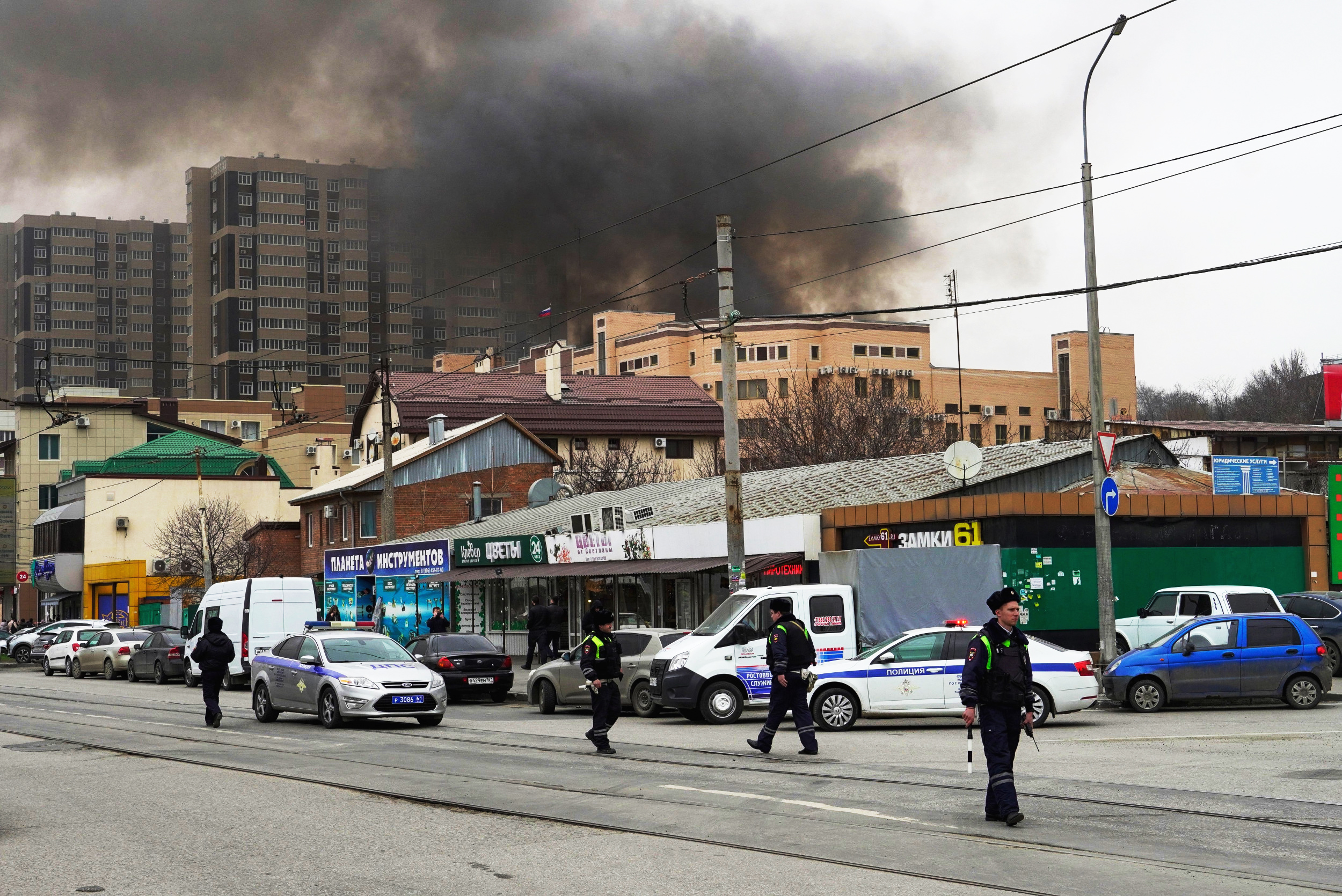Though the vast majority of Russia’s ongoing war is playing out in neighboring Ukraine, a shadowy yet increasingly active front has erupted within the borders of President Vladimir Putin‘s own domain.
Several groups purportedly comprised of Russians opposed to the Kremlin and its handling of the conflict have taken up arms, claiming brazen operations from acts of sabotage against infrastructure to assassinations of high-profile figures.
While relatively little is known about these rebel outfits complicit in activities considered terroristic by Moscow, Newsweek spoke with experts who have done extensive research into the groups and representatives of the militias themselves to provide new insights into the aims and tactics of four key insurgent organizations as well as their potential links to foreign governments such as Ukraine.
“Russia faces diverse threats from cross-border sabotage forces and domestic partisans,” Lucas Webber, co-founder of the Militant Wire research network, told Newsweek.
“In some cases, the domestic groups are connected to Ukrainian actors, creating a murky distinction,” Webber added. “This makes it very difficult for Russian intelligence and security services to prevent and intercept.”
Webber noted that beyond their shared opposition to Putin and his policies, the groups are widely diverse ideologically, ranging from far-left anarcho-communists to ultra-right neo-fascists. Their tactics are similarly diverse, with some focusing on dismantling railroads while others claim raids from Ukraine into Russia and the killing of prominent supporters of the war effort.
“This activity is not limited to Russia,” Webber added, “and likewise extends to Belarus and occupied Ukrainian territories.”
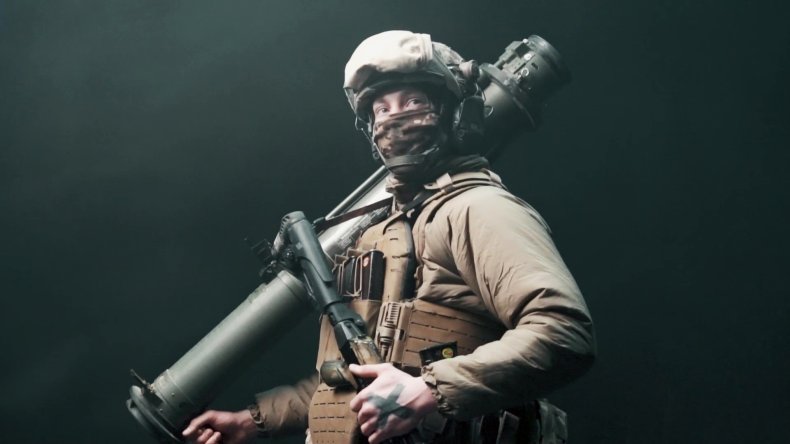
Russian Volunteer Corps
Russian Volunteer Corps
Announced in August 2022 and led by known far-right ideologue Denis Nikitin, the Russian Volunteer Corps (RVC) made international headlines last month when it claimed a cross-border raid in two villages of the western Russian province of Bryansk that official Russian reports say killed two civilians and injured two others. Using a sophisticated social media presence, the RVC published videos from within Russian territory to back up its claims of responsibility.
Days after the March operation, Russia’s Federal Security Service (FSB) accused the RVC of orchestrating an assassination attempt against prominent Russian businessman Konstantin Malofeev. And, on Thursday, the group announced yet another raid in Bryansk, once again complete with footage of the alleged incursion.
“This latest operation indicates that the Russian Volunteer Corps maintains the capacity to conduct cross-border operations,” Webber said.
The Russian Volunteer Corps is actively fighting alongside Ukrainian military forces, and segments of the group have fought for militias and the national guard, operating directly under Kyiv’s command.
The group also appears interested in further expanding its reach. On April 7, it promoted the formation of a new group calling itself the Polish Volunteer Corps, using similar imagery as the RVC, including a logo with Cyrillic letters.
Nikitin has garnered a great deal of personal notoriety even before the formation of the RVC and the beginning of the war in Ukraine. After making a name for himself among neo-Nazi soccer hooligans, he went on to found the “White Rex” clothing brand and became a mainstay in far-right mixed martial arts circles.
He is believed to have lived in Germany for some time before moving to Ukraine in 2017, where Webber said he formed connections with the Ukrainian National Guard’s Azov Battalion, also known for its far-right tendencies. As such, the RVC appears to have at least some sort of relationship with the Ukrainian Armed Forces.
“The Russian Volunteer Corps is actively fighting alongside Ukrainian military forces, and segments of the group have fought for militias and the national guard, operating directly under Kyiv’s command,” Webber said. “The group’s leader, Denis Nikitin, explicitly stated that the Bryansk operation was approved by Ukrainian authorities and its fighters have been posting videos from the battlefield over the past few months.”
Ukraine helps our struggle in every possible way. We would hardly be able to have weapons if there was no help from the state, at a minimum, and also, on the territory of Ukraine, we are under the jurisdiction of the Ministry of Defense of Ukraine.
“Moreover, the Russian Volunteer Corps seems to have been formally integrated into Ukraine’s Territorial Defense Forces,” he added. “Further, the group is also supplied with and uses weapons from the Ukrainian military’s arsenal.”
Pointing to further evidence of collusion, another Militant Wire researcher who requested due to security concerns to go by his Twitter handle, War Noir, highlighted the presence in RVC’s media of weapons sent to Ukraine by its foreign backers and not found within the Russian military.
Dispelling the argument that the arms were captured on the battlefield, War Noir told Newsweek that “many of these guns come to the RVC unused, fresh in the box.”
Photos published by the RVC show weapons appearing to come straight from their original cases, including Western-manufactured guns such as FN SCAR-L assault rifles that have been supplied to Ukraine by Belgium, as well as PZD 556 MK II light machine guns produced by Czech arms manufacturer DSS. Also present are ATN commercial off the shelf thermal scopes donated to Ukraine in the leadup to the war.
“RVC’s range of weapons is generally small,” War Noir said. “But when we look at the distribution of weapons among the members of the group, it can be easily said that the rate of use of the weapons supplied to the Ukrainian army is quite high.”
Reached for comment, a representative of the RVC acknowledged this connection.
“Of course, Ukraine helps our struggle in every possible way,” the RVC representative told Newsweek. “We would hardly be able to have weapons if there was no help from the state, at a minimum, and also, on the territory of Ukraine, we are under the jurisdiction of the Ministry of Defense of Ukraine.”
Within the Ukrainian Armed Forces, the RVC representative said that the Civil Council created in November to coordinate the recruitment of volunteers, including Russians, “is the only organization that provides us with effective support in recruiting from among our compatriots outside Ukraine, as well as representing some other interests abroad.”
Additionally, the RVC “has its own network of activists within the Russian Federation who are destroying military infrastructure,” according to the representative. The representative attributed the group’s ability to conduct activities within Russia itself to “planning, planning and more planning, as well as intelligence and a certain amount of luck, plus the poor selection of personnel in the ranks of the Russian special services.”
While typically associated with far-right and even neo-Nazi beliefs that permeate its messaging, the RVC representative said the group’s members “profess conservative views and traditionalist values.”
Russia has sought to justify its war in Ukraine by claiming a need to “de-Nazify” as well as “de-militarize” the post-Soviet republic, whose leader, President Volodymyr Zelensky has rejected the validity of these motives.
Newsweek has reached out to the Ukrainian Foreign Ministry via email for comment. The Ukrainian Defense Ministry referred Newsweek to the Main Directorate of Intelligence, which did not respond in time for publication.
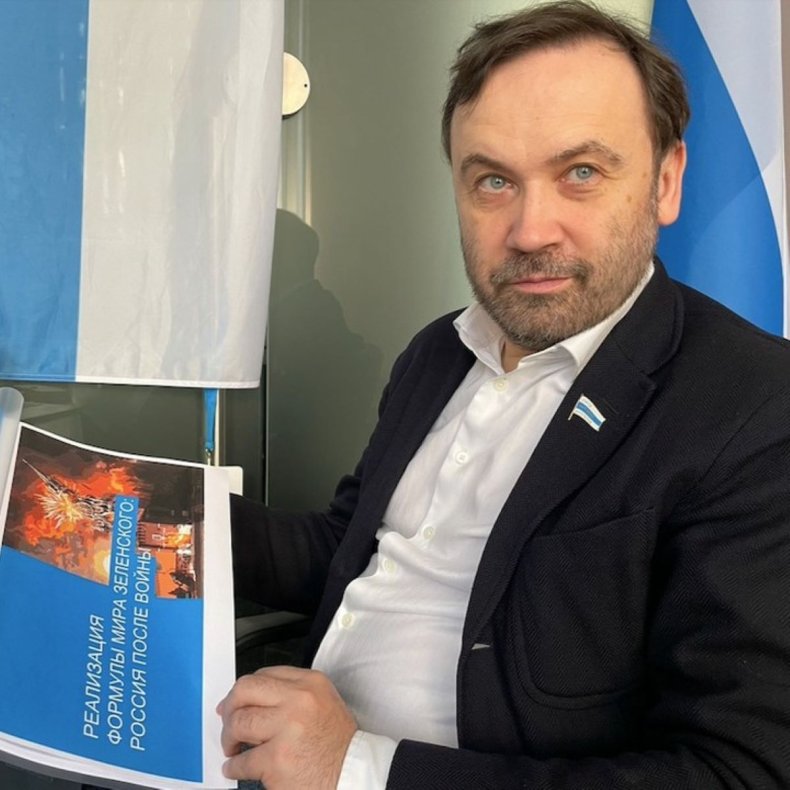
National Republican Army
The National Republican Army (NRA) also rose to prominence in August 2022 after exiled Russian parliamentarian Ilya Ponomarev claimed the group was behind the assassination of pro-war Russian journalist Darya Dugina, daughter of right-wing philosopher Alexander Dugin, outside of Moscow. Ponomarev claimed to have direct ties to the group, and said the NRA was additionally behind a series of arsons against military sites prior to Dugina’s slaying.
Though doubts have been expressed as to the substance of Ponomarev’s actual links to the NRA and its alleged operations, Militant Wire researcher Alec Bertina told Newsweek that the dismissed Russian politician “acts as a sort of public representative for the group,” and “is one of the only people that can be visibly attributed to the NRA.”
NRA is an independent network of freedom fighters inside Russia. There are several groups in approximately a dozen cities, and an IT cyberattack team.
Ponomarev’s open support for NRA-claimed violence saw him expelled from the Russian Action Committee, an opposition platform based in Lithuania, and today he is a member of the Congress of People’s Deputies, a coalition of exiled Russian lawmakers based in Poland.
As for the NRA’s ideology, Bertina said that “the group presents itself as an underground anti-invasion and anti-Putinist partisan movement within Russia, coordinating resistance efforts via social media.”
“They also favor resistance to the present Russian government that leads to formation of a new democratic Russia,” Bertina explained, “which is achieved either through those in power in Russia currently ceding power due to the threat of violence or obtaining it through the use of violence.”
Still, skepticism looms over the connection between the NRA and the operations they claim, including the recent assassination of prominent pro-war Russian blogger Vladlen Tatarsky in a St. Petersburg cafe.
“We only really have Ilya Ponomarev and social media entities connected to the NRA claiming the NRA’s responsibility for the assassinations of Dugina and Tatarsky,” Bertina said. “What is striking is neither Russian, Ukrainian or any Western officials/authorities have attributed these assassinations to the NRA.”
Reached for comment, Ponomarev told Newsweek that he “was asked by NRA to be the entry point for their communication with the outside world” and that he has “agreed to help them in a similar fashion” as he assists the Freedom of Russia Legion, an arm of the Ukrainian Armed Forces comprised of Russian and Belarusian volunteers.
“They sometimes confidentially share their plans with me; sometimes ask me for advice or some other assistance,” Ponomarev said. “But that does not make me organizationally affiliated with them or any other partisan groups in Russia.”
Describing the group, he said that the “NRA is an independent network of freedom fighters inside Russia” and “there are several groups in approximately a dozen cities, and an IT cyberattack team.”
“To my knowledge,” he added, “NRA does not have any connection with foreign governments or organizations.”
Ponomarev asserted that his “support of any armed resistance is conditional on simple condition,” that “it is within boundaries set by Geneva conventions on rules of war and decisions of Congress of People’s Deputies, that explicitly prohibits attacks on civilians not involved in organizing, financing and promoting the aggressive wars staged by Putin’s regime.”
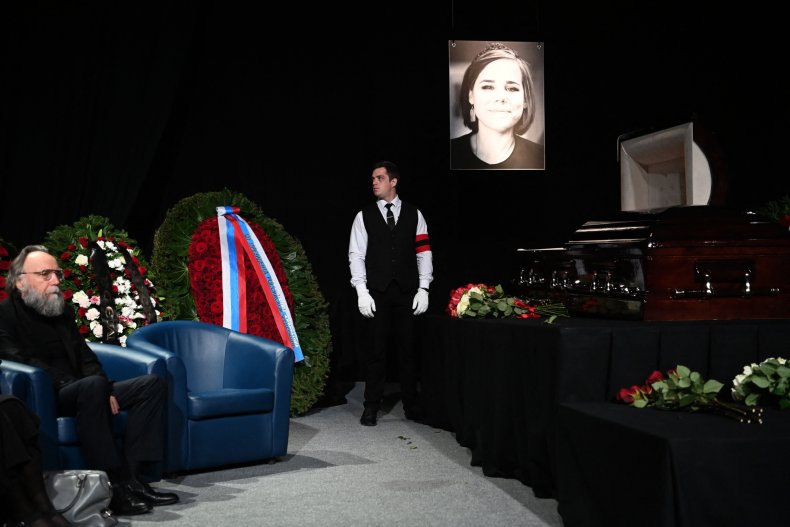
Photo by KIRILL KUDRYAVTSEV/AFP via Getty Images
Russian officials have attributed Dugina’s killing to the work of Ukrainian intelligence services and the death of Tatarsky to Ukrainian spies working with supporters of imprisoned Russian politician Alexei Navalny, namely St. Petersburg resident Darya Trepova, to whom both representatives of Navalny and Ponomarev have denied connections.
Kyiv has also denied any role in either plot, though a New York Times report last August cited unnamed intelligence officials suggesting some part of the Ukrainian government may have played a role in Dugina’s assassination.
“It also worth noting that if these assassinations were conducted by an intelligence service belonging to any state actor,” Militant Wire’s Bertina said, “they would be designed to be plausibly deniable, with any state involved resorting to manufacture any narrative seen necessary to hide culpability.”
“It is therefore highly doubtful that any credible and compelling evidence will come out concerning who did it,” he added, leaving open the possibility that “the NRA might be exploiting this to take credit for the work of another actor.”
Bertina broke down four key points of the NRA’s messaging on these high-profile acts: “That these assassinations are connected, that the NRA was responsible for both of them, that as an organization they have the capabilities to pull off either assassination,” and that “no state actor was involved in them.”
Additionally, while the NRA has touted the so-called Irpin Declaration that would align it with both the RVC and the Freedom of Russia Legion, the RVC has denied signing the document and has asserted that it did not recognize the tricolor white-blue-white flag used by the NRA and Ponomarev, or their stated liberal ideology.
Newsweek has reached out to the Congress of People’s Deputies, the National Republican Army’s press service and the Russian Action Committee via email for comment.
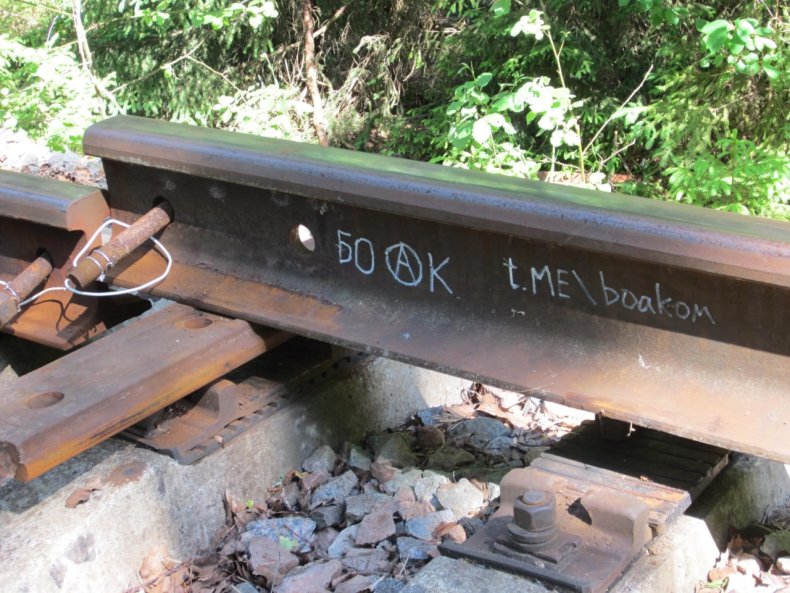
Combat Organization of Anarcho-Communists
Combat Organization of Anarcho-Communists
The founding of the far-left Combat Organization of Anarcho-Communists (commonly known by its Russian acronym, BOAK) actually preceded the war in Ukraine, with its official blog in existence since at least September 2020, while affiliated channels date back to 2018 and other evidence of the group has been seen as far back as 2016.
Militant Wire co-founder Thomas Lord calls the group “the most notable” of the active Russian rebel movements, as it regularly posts firsthand evidence of attacks on infrastructure. Prior to the war, some of these actions were claimed in solidarity with other left-wing organizations such as Kurdish groups battling the Turkish Armed Forces in Syria, but the Russian war machine is firmly in BOAK’s sights since February 2022.
“Various groups have claimed the detonation of improvised explosive devices (IEDs) targeting Russian rails as well as simpler acts of sabotage,” Lord told Newsweek, “but BOAK in particular has proclaimed a concerted campaign to attack Russian railways, specifically those leading from military logistics hubs to battlefields in Ukraine.”
BOAK in particular has proclaimed a concerted campaign to attack Russian railways.
In many cases, Russian media has corroborated these attacks, with former President Dimitry Medvedev, now deputy chair of the Security Council, calling in November for the reinstatement of the death penalty for wartime saboteurs.
Unlike acts claimed by the RVC and NRA, however, Lord said there was little indication that Ukrainian intelligence services were behind BOAK’s guerrilla campaign.
“BOAK are convincingly a homegrown group who does not receive outside support,” Lord said, “not only because of their antebellum history in Russia, but because of their dedication to share and perfect partisan tradecraft on their Telegram channels.”
This dedication includes sharing a wealth of literature and instructions on how to wreak havoc on infrastructure using largely homemade tools. A number of other smaller groups appear to have answered the call as well, creating a potentially dangerous network of saboteurs within Russia.
“BOAK and aligned groups have a measurable evolution in capabilities since the start of the war in February 2022,” Lord said. “What began with rather simple sabotage acts of shunting Russian railways has progressed to the use of IEDs and other more advanced methods.”
Asked about potential CIA ties during a documentary interview published by Popular Front in January, a BOAK member laughed and claimed, “I think if we were CIA we would act more effectively, but we act with the resources we have.”
Reached for comment, a White House National Security Council spokesperson told Newsweek that “we do not encourage or enable attacks inside of Russia.”
Newsweek has reached out to the Combat Organization of Anarcho-Communists via email and Telegram for comment.
In September, a BOAK representative told Newsweek that the group’s ideology was spelled out in its name, “we are anarcho-communists.” The representative said at the time that the group sought “direct grassroots democracy” in Russia, something that “is impossible without a radical breakdown of the current order—a revolution, to put it bluntly.”
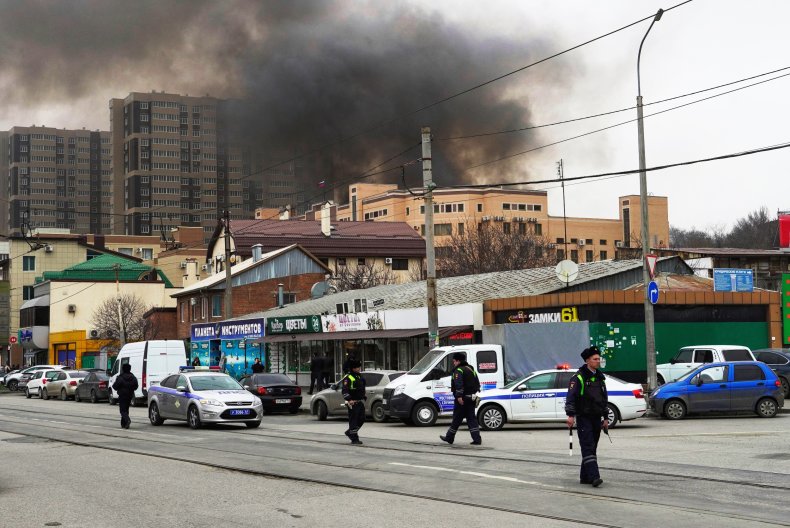
AFP/Getty Images
Black Bridge
Out of the four major groups claiming attacks within Russia, the least is known about the one that calls itself Black Bridge.
Like the RVC and NRA, Black Bridge first garnered significant attention in August 2022 by calling for action to disrupt the internationally unrecognized referendums held by Russia to annex the Ukrainian territories of Donetsk, Kherson, Luhansk and Zaporizhzhia. But its first major operation is believed to be an apparent attack last month on a Rostov-on-Don FSB office that reportedly killed four people and injured five others.
Video of the purported operation and Black Bridge’s claim to it were shared by BOAK and made waves across the Russian militant underground, even as Russian authorities attributed the blast to fuel lubricants ignited by an accidental electrical short-circuit.
Speaking to Newsweek, a representative of Black Bridge said that this action shattered the “stereotyped attitude that ‘all Russians are for Putin.'”
We, too, prefer to remain independent and unpredictable.
The representative said that the group sought “the fall of the Putin regime,” but has maintained a “moratorium on political discussions” until then. “Our aim is to wipe out Putinist fascism to its roots in order to create space for a new state comprised of sane people, to bring back normal life to the country along with a normal future,” the representative said.
The group is able to evade Russian security services under a security policy called “paranoid Zero Trust,” according to the representative.
“In short, any contact can be hacked, information leaked unintentionally, or turn out to be a set-up,” the Black Bridge representative said. “We teach this to supporters and activists, we urge them not to trust anyone, including us. You can’t reveal what you don’t know.”
As for Black Bridge’s support base, the representative said the group is aided “only by sympathizers and supporters.” Among foreign governments and citizens, including those of Ukraine, the representative said Black Bridge members “maintain different contacts, but it’s hard to call it coordination.”
“The activists with whom we work are completely free in their actions,” the Black Bridge representative added. “We, too, prefer to remain independent and unpredictable.”
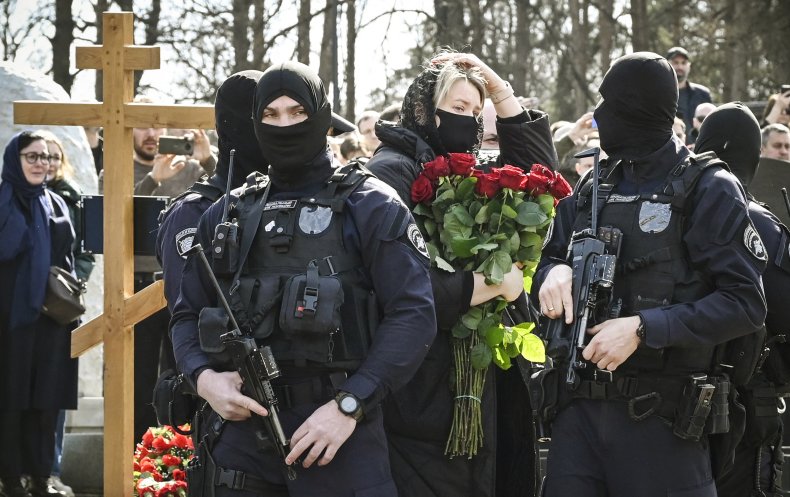
ALEXANDER NEMENOV/AFP/Getty Images
The View from Moscow
Moscow, for its part, views all such groups as part of a legacy of terrorism in modern Russia dating back to the early post-Soviet period of the 1990s, when the Kremlin launched the first of two wars against separatist militants in the far southern Chechnya region.
“We do remember that, under the flag of domestic terrorism and separatism that was presented as the love for freedom, actually international terrorism was perpetrating atrocities against our country from within and against our citizens,” Russian Foreign Ministry spokesperson Maria Zakharova said in response to Newsweek‘s question during a press briefing Wednesday.
“That is why we have the experience and we have the expertise on how to deal with that,” Zakharov said, “and we have the real assessments of what is happening.”
These crimes cannot be justified and there will be punishment.
Citing intelligence from Russian security services, she argued that the link between the Ukrainian government and such operations “is an obvious thing for us” that occurs “sometimes with somebody else” involved.
Newsweek has reached out to the FSB via email for comment.
“I can also say that Russian security services that are selflessly fighting against terrorism, they’re controlling the situation in this area, they are efficiently preventing much of the terrorist attacks that were planned,” Zakharova said. “They are also investigating crimes that were perpetrated. That is why these crimes cannot be justified and there will be punishment.”
She also cast blame on Washington, given its open support for Kyiv. Such growing aid stems from the 2014 uprising that brought a pro-West government to Ukraine and sparked unrest and conflict that have served as a leadup to the current war, which both Russia and Ukraine accuse one another of instigating.
“That means that the United States is behind and is responsible for everything that the Kyiv regime is doing,” she said, “and we have not hidden it.”
